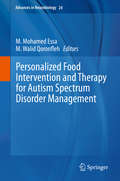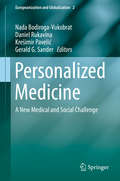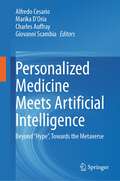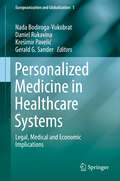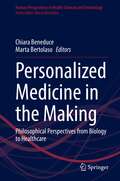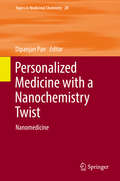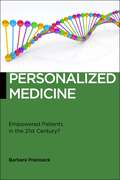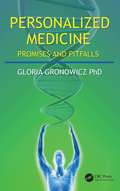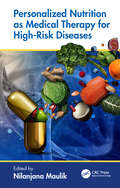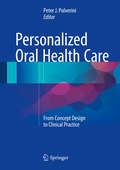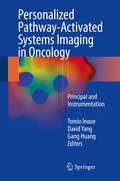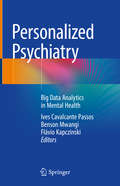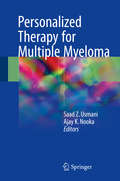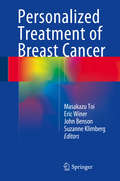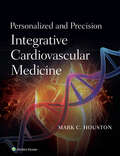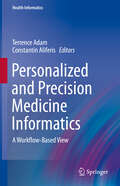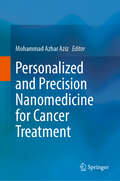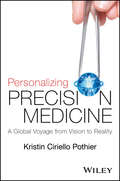- Table View
- List View
Personalized Food Intervention and Therapy for Autism Spectrum Disorder Management (Advances in Neurobiology #24)
by M. Mohamed Essa M. Walid QoronflehThe book focuses on implications of traditional and processed foods for autism spectrum disorder (ASD) intervention and management. Numerous phytonutrients and pharmacologically active compounds in edible natural products and diet could influence and offer protection to neuronal dysfunction that occurs due to ASD. The neuroprotective effects of various fruits, vegetables, nuts and seeds phytochemicals, and other natural bioactive ingredients against ASD and related conditions are discussed. Topics such as the possible neuroprotective mechanism of action of these foods and the therapeutic role of antioxidants in relation to ASD are addressed. This book also highlights the scope of using anti-inflammatory agents and antioxidants to promote neurogenesis and improve other symptoms in ASD. It emphasizes personalized nutritional approaches with dietary management of neurodevelopmental disorders/ASD cases. Information in this book is relevant to researchers in the field of complementary and alternative medicine, nutraceuticals, neuroscience, agriculture, nutrition, and food science. This volume is beneficial to students of varying levels, and across multiple disciplines.
Personalized Hip and Knee Joint Replacement
by Charles Rivière Pascal-André VendittoliThis open access book describes and illustrates the surgical techniques, implants, and technologies used for the purpose of personalized implantation of hip and knee components. This new and flourishing treatment philosophy offers important benefits over conventional systematic techniques, including component positioning appropriate to individual anatomy, improved surgical reproducibility and prosthetic performance, and a reduction in complications. The techniques described in the book aim to reproduce patients’ native anatomy and physiological joint laxity, thereby improving the prosthetic hip/knee kinematics and functional outcomes in the quest of the forgotten joint. They include kinematically aligned total knee/total hip arthroplasty, partial knee replacement, and hip resurfacing. The relevance of available and emerging technological tools for these personalized approaches is also explained, with coverage of, for example, robotics, computer-assisted surgery, and augmented reality. Contributions from surgeons who are considered world leaders in diverse fields of this novel surgical philosophy make this open access book will invaluable to a wide readership, from trainees at all levels to consultants practicing lower limb surgery
Personalized Mechanical Ventilation: Improving Quality of Care
by Jorge Hidalgo Robert C Hyzy Ahmed Mohamed Reda Taha Yasser Younis A. TolbaIn dealing with the unprecedented COVID-19 pandemic, there are an increased number of patients requiring personalized management as the disease pathology varies. With variable lung compliance and airway resistance as well as the severity of the disease, one size will not fit all patients. This book is problem-oriented with evidence-based discussions of the daily encountered scenarios in the ICU for mechanically ventilated patients, dealing with the pathology, monitoring and troubleshooting facing intensivists daily. These scenarios are managed utilizing a goal-directed approach and algorithms to achieve these goals. All chapters contain an explanation of a different solution illustrating the respiratory mechanics, physiology and pathology involved in such a scenario. Each chapter also closes with a take-home message to summarize the content. In addition to describing the ventilation of different patient categories, this text also features ventilation cases specific to COVID-19 including airway management in the enhanced air born isolated patient, pulmonary embolism, different states of shock and differential lung ventilation. There is also a specific chapter on monitoring mechanical ventilation with point of care ultrasound, which is an available modality in most ICUs. Another unique chapter describes how to connect more than one patient to one ventilator in case of a shortage of machines. Written by experts in the field, Personalized Mechanical Ventilation is a timely and valuable resource for critical care physicians, nurses and respiratory therapists on the front lines of both COVID-19 and day-to-day care of mechanically ventilated patients in the ICU.
Personalized Medicine
by Nada Bodiroga-Vukobrat Daniel Rukavina Krešimir Pavelić Gerald G. SanderThis book offers comprehensive coverage of the various aspects of personalized medicine as an original approach to classifying, understanding, treating and preventing disease based on individual biological differences. In the introductory section, it defines personalized medicine as a way toward new medical practices and addresses the question: What can personalized medicine offer citizens, medical professionals, reimbursement bodies and stakeholders? Subsequent chapters discuss the technological aspects of personalized medicine: data collection, comprehensive integration and handling of data, together with key enabling factors in developing the requisite technological support for personalized medicine. Lastly, the book explores the main issues shaping the implementation and development of personalized medicine - education, stakeholder participation, infrastructure, a new approach to the classification of disease and medical tests, regulatory frameworks, and new reimbursement models - together with ethical, legal and social issues. Ultimately, the book calls for interdisciplinarity and a radical change in the way we approach the health and wellbeing of individuals. Target groups are medical doctors and researchers in the field of biomedicine, as well as experts from the social sciences dealing with legal, economic and social aspects of health system issues in general. Though the book will primarily benefit these groups of professional experts, its content will also appeal to a far wider readership, as it deals with a paradigm shift in one of society's main pillars - the health system.
Personalized Medicine Meets Artificial Intelligence: Beyond “Hype”, Towards the Metaverse
by Alfredo Cesario Marika D’Oria Charles Auffray Giovanni ScambiaThe book provides a multidisciplinary outlook on using Artificial Intelligence (AI)-based solutions in the field of Personalized Medicine and its transitioning towards Personalized Digital Medicine.The first section integrates different perspectives on AI-based solutions and highlights their potential in biomedical research and patient care. In the second section, the authors present several real-world examples that demonstrate the successful use of AI technologies in various contexts. These include examples from digital therapeutics, in silico clinical trials, and network pharmacology. In the final section of the book, the authors explore future directions in AI-enhanced biomedical technologies and discuss emerging technologies such as blockchain, quantum computing and the “metaverse”. The book includes discussions on the ethical, regulatory, and social implications for an AI-based personalized medicine. The integration of heterogeneous disciplines brings together multiple stakeholders and decision makers involved in the personalization of care. Clinicians, students, and researchers from academia and the industry can benefit from this book, since it provides foundational knowledge to drive advances in personalized biomedical research and health care.
Personalized Medicine in Anesthesia, Pain and Perioperative Medicine
by Ali DabbaghThis book discusses the current and future impact of cellular and molecular medicine (CMM) on anesthesiology and perioperative medicine. It covers the topic from a translational perspective and describes the relevance of CMM to daily clinical practice. Taking a bench-to-bedside approach, chapters examine topics including perioperative acute and chronic management, perioperative organ protection, and novel pharmaceuticals. Personalized Medicine in Anesthesia, Pain and Perioperative Medicine is aimed at anesthesiologists and pain physicians, and will also be of interest to pharmacists and those working in cellular and molecular medicine.
Personalized Medicine in Healthcare Systems: Legal, Medical and Economic Implications (Europeanization and Globalization #5)
by Nada Bodiroga-Vukobrat Daniel Rukavina Krešimir Pavelić Gerald G. SanderThis book gathers scientific contributions on comprehensive approaches to personalized medicine. In a systematic and clear manner, it provides extensive information on the methodological, technological, and clinical aspects of high-throughput analytics, nanotechnology approaches, microbiota/human interactions, in-vitro fertilization and preimplantation, and various diseases like cancer.Moreover, the book analyzes the social and legal aspects of social security systems, healthcare systems and EU law – e.g. the role of solidarity, regulatory possibilities and obstacles, justice and equality, privacy/disclosure of data, and the right to know – from an interdisciplinary perspective. Lastly, it explores the economical and ethical context in the fields of business models, intellectual property issues, the patient/physician relationship, and price discrimination.
Personalized Medicine in the Making: Philosophical Perspectives from Biology to Healthcare (Human Perspectives in Health Sciences and Technology #3)
by Marta Bertolaso Chiara BeneduceThis book offers a multidisciplinary look at the much-debated concept of “personalized medicine”. By combining a humanistic and a scientific approach, the book builds up a multidimensional way to understand the limits and potentialities of a personalized approach in medicine and healthcare. The book reflects on personalized medicine and complex diseases, the relationship between personalized medicine and the new bio-technologies, personalized medicine and personalized nutrition, and on some ethical, political, economic, and social implications of personalized medicine. This volume is of interest to researchers from several disciplines including philosophy, bio-medicine, and the social sciences.
Personalized Medicine with a Nanochemistry Twist
by Dipanjan PanMedicinal chemistry is both science and art. The science of medicinal chemistry offers mankind one of its best hopes for improving the quality of life. The art of medicinal chemistry continues to challenge its practitioners with the need for both intuition and experience to discover new drugs. Hence sharing the experience of drug research is uniquely beneficial to the field of medicinal chemistry. Drug research requires interdisciplinary team-work at the interface between chemistry, biology and medicine. Therefore, the topic-related series Topics in Medicinal Chemistry covers all relevant aspects of drug research, e. g. pathobiochemistry of diseases, identification and validation of (emerging) drug targets, structural biology, drugability of targets, drug design approaches, chemogenomics, synthetic chemistry including combinatorial methods, bioorganic chemistry, natural compounds, high-throughput screening, pharmacological in vitro and in vivo investigations, drug-receptor interactions on the molecular level, structure-activity relationships, drug absorption, distribution, metabolism, elimination, toxicology and pharmacogenomics. In general, special volumes are edited by well known guest editors.
Personalized Medicine: Empowered Patients in the 21st Century? (Biopolitics #7)
by Barbara PrainsackInside today's data-driven personalized medicine, and the time, effort, and information required from patients to make it a realityMedicine has been personal long before the concept of “personalized medicine” became popular. Health professionals have always taken into consideration the individual characteristics of their patients when diagnosing, and treating them. Patients have cared for themselves and for each other, contributed to medical research, and advocated for new treatments. Given this history, why has the notion of personalized medicine gained so much traction at the beginning of the new millennium? Personalized Medicine investigates the recent movement for patients’ involvement in how they are treated, diagnosed, and medicated; a movement that accompanies the increasingly popular idea that people should be proactive, well-informed participants in their own healthcare.While it is often the case that participatory practices in medicine are celebrated as instances of patient empowerment or, alternatively, are dismissed as cases of patient exploitation, Barbara Prainsack challenges these views to illustrate how personalized medicine can give rise to a technology-focused individualism, yet also present new opportunities to strengthen solidarity. Facing the future, this book reveals how medicine informed by digital, quantified, and computable information is already changing the personalization movement, providing a contemporary twist on how medical symptoms or ailments are shared and discussed in society. Bringing together empirical work and critical scholarship from medicine, public health, data governance, bioethics, and digital sociology, Personalized Medicine analyzes the challenges of personalization driven by patient work and data. This compelling volume proposes an understanding that uses novel technological practices to foreground the needs and interests of patients, instead of being ruled by them.
Personalized Medicine: Promises and Pitfalls
by Gloria GronowiczPersonalized Medicine: Promises and Pitfalls broadly explores the tailoring of medical treatment to a patient‘s characteristics, needs, and preferences during all stages of care, including prevention, diagnosis, treatment, and follow-up.The book‘s goal is to explain the science behind personalized medicine, what impact it may have on specific disea
Personalized Nutrition as Medical Therapy for High-Risk Diseases
by Nilanjana MaulikPersonalized nutrition involves the formulation of individualized nutritional recommendations to promote and maintain health based on an individual's genetic makeup and other unique intrinsic and extrinsic factors. Implementing personalized nutrition plans for individuals with certain diseases or who are in danger of developing health conditions could help control the onset and severity of symptoms. Personalized Nutrition as Medical Therapy for High-Risk Diseases offers a practical guide for physicians seeking to provide tailored dietary recommendations to their patients with disease treatment, modulation and prevention in mind. The book focuses on the biological mechanisms of specific diseases and provides evidence for how personalized nutrition positively impacts them. It explores conditions including cardiovascular diseases, hypertension, hypercholesteromia, diabetes, obesity, Crohn's disease, as well as multiple pediatric, renal and psychological disorders. Features: · Includes case studies that document how people respond differently towards food depending on their genetic structure and other factors. · Discusses genome wide association studies (GWIMS) to understand the interplay between genetic susceptibility and dietary interactions. · Provides users information to effectively implement personalized nutrition into practice. · Identifies possible challenges to the implementation of personalized nutritional interventions in a clinical setting. This book is for medical practitioners and will also appeal to researchers and students.
Personalized Nutrition: Principles and Applications
by Frans Kok Laura Bouwman Frank DesiereFrom one person to the next, optimal health is governed by a huge array of minor genetic differences. When modulated by a variety of food bioiactives, these differences result in changes in gene expression and subsequent phenotypic expression. Combining biomedical and social science with contributions from leaders in both fields, Personalized Nutri
Personalized Oral Health Care
by Peter J. PolveriniThis book provides an overview of the oral health care environment as the transition is made to a system increasingly focusing on disease prevention, early intervention to minimize disease progression, and a personalized approach that meets each individual's needs. Descriptions are provided of an array of technologies based on rapid advances in genomic medicine and omics technology that are already entering clinical practice and promise to have a huge impact on risk assessment, diagnosis, and therapy. Detailed consideration is also paid to personalized health insurance in the new environment, the impact of personalized health care on the economics of health care, and the consequences for the global diagnostic market place and improved access to care. The changes in dental education required to produce dentists better equipped to participate in the new health care environment are examined, and the book concludes by considering key opportunities and challenges.
Personalized Pathway-Activated Systems Imaging in Oncology
by David Yang Tomio Inoue Gang HuangThis comprehensive volume covers radiopharmaceuticals developed for pathway-directed systems in imaging and theranostic applications. We now are at the cutting edge of providing personalized treatment with increased use in oncology of these new radiopharmaceuticals. Trends in high-resolution instrumentation development, quality assurance systems and regulatory compliance for radiopharmaceuticals, clinical evaluation of radiopharmaceuticals, and benefits and pitfalls of the current clinical FDG PET are discussed. Radiopharmaceuticals are used for diagnosis of diseases of the central nervous and cardiovascular systems and for staging, restaging, and treatment planning for cancers. Nuclear biomarkers allow precise measurement of molecular pathways on a whole-body image upon administration of functional radiolabeled agents, and nuclear imaging agents have potential use in patient selection, pharmacokinetic, dosage-finding, and proof-of-concept studies. Nuclear imaging agents and hybrid instrumentation also provide sensitive and specific answers for differential responsiveness in therapeutic outcome. This book serves as a reference for moving the discovery and development of radiopharmaceuticals from the workbench to clinical applications. It thus benefits not only clinicians but also translational research scientists--molecular biologists, chemists, imaging scientists, pharmaceutical developers, physicists, and support staff.
Personalized Psychiatry: Big Data Analytics in Mental Health
by Ives Cavalcante Passos Benson Mwangi Flávio KapczinskiThis book integrates the concepts of big data analytics into mental health practice and research.Mental disorders represent a public health challenge of staggering proportions. According to the most recent Global Burden of Disease study, psychiatric disorders constitute the leading cause of years lost to disability. The high morbidity and mortality related to these conditions are proportional to the potential for overall health gains if mental disorders can be more effectively diagnosed and treated. In order to fill these gaps, analysis in science, industry, and government seeks to use big data for a variety of problems, including clinical outcomes and diagnosis in psychiatry. Multiple mental healthcare providers and research laboratories are increasingly using large data sets to fulfill their mission. Briefly, big data is characterized by high volume, high velocity, variety and veracity of information, and to be useful it must be analyzed, interpreted, and acted upon. As such, focus has to shift to new analytical tools from the field of machine learning that will be critical for anyone practicing medicine, psychiatry and behavioral sciences in the 21st century. Big data analytics is gaining traction in psychiatric research, being used to provide predictive models for both clinical practice and public health systems. As compared with traditional statistical methods that provide primarily average group-level results, big data analytics allows predictions and stratification of clinical outcomes at an individual subject level.Personalized Psychiatry – Big Data Analytics in Mental Health provides a unique opportunity to showcase innovative solutions tackling complex problems in mental health using big data and machine learning. It represents an interesting platform to work with key opinion leaders to document current achievements, introduce new concepts as well as project the future role of big data and machine learning in mental health.
Personalized Specialty Care: Value-Based Healthcare Frontrunners from the Netherlands
by Nico Van Weert Jan HazelzetThis book highlights the work of pioneers in this field, in order to inspire their peers, healthcare leaders and an interested audience. Prior to the respective care practices, the authors describe the core of personalized care and illustrate its connections to value-driven care and evidence-based medicine. The last part of the book addresses organizational and other conditions under which personalized care can thrive.In the Netherlands, substantial work is being done on value-driven care and more is currently being discussed. This book focuses on the benefits of value-driven care for patients and healthcare providers alike. To do so, it explores a range of representative cases and scenarios, such as: Scenario 1: You are able to surgically remove the most difficult tumors and find out one day that you don’t need to do so in all indicated patients. Later you can find out how to recognize when surgery isn’t the best treatment for certain patients. And now your team has a fixed routine to find the optimal choice together with the patient. Scenario 2: You consider yourself to be a patient-centered doctor who is really in touch with their patients – until you ask them to report for themselves on how they are doing. In the "patient-reported outcomes" you see that you have completely missed an important aspect. Later, you can structurally integrate this into your outpatient clinic. Scenario 3: In line with the planning principles of your hospital, you see chronic patients once a year – and of course also 'as needed' – until your data shows you that you see patients too early or too late, but rarely when it would be most helpful. Later you can discover how to offer your consultation exactly on time – based on early signals and often even before the patient calls the clinic. This is what value-driven care is all about: care is of more significance to the patient when it is tailored to his or her unique situation. Recognizing the patient’s needs, preferences and values, and structurally adapting care accordingly – that is the noble profession of value-driven care, which takes us an important step closer to the ideal of personalized care.
Personalized Therapy for Multiple Myeloma
by Saad Z. Usmani Ajay K. NookaThis book provides the clinician with concise, practical guidance on risk stratification and therapeutic decision making in patients with multiple myeloma. In addition, the available clinical trial and research data are summarized into meaningful reviews and evidence-based recommendations for treatment are presented. The coverage encompasses all phases and forms of disease, including high-risk myeloma. Over recent decades, greater understanding of the biology of myeloma has fostered the development of new, more effective drugs, leading to remarkable improvements in survival. To continue this momentum, several recent prospective trials have aimed to identify further potential therapeutic targets or to evaluate various combinations of anti-myeloma agents. The increasing abundance of management options makes the decision making complex in different phases of the disease. This book will offer the clinician valuable assistance in the choice and sequencing of therapies, highlighting the need for a personalized approach that reflects the growing recognition that myeloma is not one uniform disease.
Personalized Treatment Options in Dermatology
by Thomas Bieber Frank NestleThis book is a quick reference guide to the new, more personalized approaches to the management of skin disorders that have emerged as a result of progress in our understanding of the genetic background and pathophysiology of skin diseases and the diversity of mechanisms underlying their clinical heterogeneity. A wide range of personalized and targeted therapies are described, including those for different skin cancers, chronic inflammatory skin diseases, and autoimmune diseases. In addition, readers will find that the book documents how research results in personalized medicine can be effectively transferred to dermatological practice and looks forward to future treatments that might be developed on the basis of recent research findings. The authors are all recognized experts in the field, and the text is presented in a reader-friendly format and well illustrated.
Personalized Treatment of Breast Cancer
by John Benson Masakazu Toi Eric Winer Suzanne KlimbergThisbook deals with the essential factors in the personalization of treatment forprimary breast cancer. These include host issues, lymph node surgery, radiationtherapy, and preoperative systemic treatment requiring specialized knowledge,multidisciplinary care experience, techniques, and research. Locoregionaltreatment in conjunction with systemic treatments is another important factor,with options for local therapy significantly affected by genetic BRCA mutation. Axillary treatment issues have become top priorities in recent primary breastcancer care, and these are highlighted in the book's presentation oftechnological advances in lymph node mapping and diagnosis, axillary clearancein patients with nodal metastasis, and the role of axillary surgery. Attentionis also given to locoregional treatment after preoperative systemic therapy. Becausetherapeutic impact differs depending upon biological characteristics such astumor subtype, local therapy should be based both on tumor biology and on therapeuticresponse in parallel. Associated translational research and mathematicalprediction tools such as nomograms also are introduced. This book provides theessence of primary breast cancer care, particularly its individualization withnovel therapeutic concepts and strategies, and will greatly benefit physiciansand clinical investigators in breast cancer institutions.
Personalized and Precision Integrative Cardiovascular Medicine
by Mark HoustonEncompassing functional cardiology, integrative medicine, and metabolic medicine/cardiology, this unique reference offers an up-to-date, expert approach to heart health wellness and treating the diseased heart and blood vessels. It provides today’s practitioners with insight into various treatment options and alternatives to pharmaceutical care and surgery, incorporating new scientific information on metabolic and integrative cardiovascular medicine from peer-reviewed articles, evidence-based medicine, and human clinical research as a foundation for practical clinical information.
Personalized and Precision Medicine Informatics: A Workflow-Based View (Health Informatics)
by Terrence Adam Constantin AliferisThis book adopts an integrated and workflow-based treatment of the field of personalized and precision medicine (PPM). Outlined within are established, proven and mature workflows as well as emerging and highly-promising opportunities for development. Each workflow is reviewed in terms of its operation and how they are enabled by a multitude of informatics methods and infrastructures. The book goes on to describe which parts are crucial to discovery and which are essential to delivery and how each of these interface and feed into one-another.Personalized and Precision Medicine Informatics provides a comprehensive review of the integrative as well as interpretive nature of the topic and brings together a large body of literature to define the topic and ensure that this is the key reference for the topic. It is an unique contribution that is positioned to be an essential guide for both PPM experts and non-experts, and for both informatics and non-informatics professionals.
Personalized and Precision Nanomedicine for Cancer Treatment
by Mohammad Azhar AzizThis book discusses the role of nanotechnology and nanomaterials in precision and personalized medicine approaches toward cancer diagnosis, treatment, early detection, and efficient drug delivery. It also covers the applications of nanotechnology in tumor chemotherapy through increasing the specificity of anticancer agents, enhancing the killing effect of tumors, and reducing the toxic and side effects. It also discusses the significance of cancer stem cells in the diagnosis and prognosis of cancer and prospects for targeting cancer stem cells for cancer therapies by nanomaterial. Further, a chapter discusses the current status and future perspectives of actively targeted theranostics nanoparticles for tumors and associated challenges. The chapter also reviews the therapeutic role of different species of nanoparticles for enhanced radio sensitization in cancers. The subsequent chapters cover the recent advances in nanotechnology-based chemoprevention strategies for various cancers.Useful aspect of computational tools and methods in Cancer nanomedicine is discussed. This is an ideal book for students, oncologists, and researchers working in allied fields of nanotechnology, cancer, and targeted drug delivery.
Personalized, Evolutionary, and Ecological Dermatology
by Robert A. NormanThis book discusses the exciting potential for dermatology to embrace developments to enhance the profession's valuable pattern recognition, diagnostic, and treatment skills. Personalized medicine (PM) and genomics are easily accessible and enable the customization of healthcare using molecular analysis to influence medical decisions, practices, and therapies for the individual patient. The evolution of the skin, and the manner in which dermatological conditions are described and managed, reveals the need to consider many aspects on a personal level. New research data are based on the use of evolutionary medicine and genomics to highlight how we can become more successful at finding the most efficacious types of antibiotic or therapy and dosage for a particular disease or pathogen and build a competitive edge by prevention and risk management against invasive viruses, bacteria, or wrongly administered drugs. As more is understood about what grows on us and how it all interacts, along with how the introduction of new antibiotics, biologics, and other therapies affect our skin's ecological balance, this book aims to create a heightened sense of the importance and offerings of ecological dermatology.
Personalizing Precision Medicine: A Global Voyage from Vision to Reality
by Kristin Ciriello PothierThe author uses decades of experience and interviews with experts in precision medicine to explain past, present, and future of precision medicine. She reviews the full continuum of personalizing precision medicine, including diagnostics, therapeutics, big data, supportive care, regulation, and reimbursement and innovation in precision medicine worldwide.• Combines a unique cross section of history, current technologies, and future directions for how precision medicine has and will affect people worldwide• Reviews precision medicine around the world, including the US, China, Japan, the Middle East, India, Europe, and Latin America• Discusses a number of diseases areas – cancer, cardiovascular, neurodegenerative, infectious disease, pain, immunology, rare diseases• Includes information and quotes from over 100 interviews with key industry experts in biotech, pharma, informatics, diagnostics, health providers, advocacy groups, and more.• Includes stories illustrating current issues and future promises in precision medicine for a human touch
